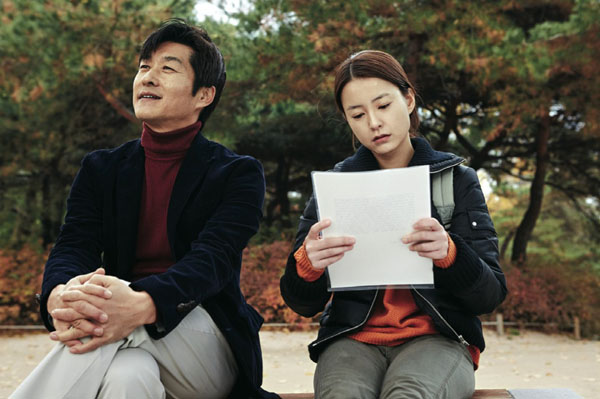“Hong Sang-soo delivers another pleasurable, loquacious and low-key film with Our Sunhi (U ri Sunhi), the tale of a female film student who has to deal with the rigid ideas three men have of who she is and what she should do with her life,” begins Boyd van Hoeij in the Hollywood Reporter. “[E]ven compared to much of the filmmaker’s recent output, such as the Cannes-selected Isabelle Huppert vehicle In Another Country, this is a pretty minor entry; the digitally shot cinematic equivalent of a fluidly drawn, customary doodle.”
OUR SUNHI, Hong Sang Soo. Deceptively light (aren’t most of his recent films?) philosophically rich film about what it means 2 know an other
— Shelly Kraicer (@skraicer) August 11, 2013
“Recent film school grad Sunhi (Jung Yumi) decides she wants to do post-graduate work in the U.S. before turning her attention to movies and asks her old professor Donghyun (Kim Sangjoong) for a recommendation,” writes Eric Kohn, setting it up at Indiewire. “Later, she runs into Munsu (Lee Sunkyun), an ex-boyfriend who has made a movie based on their romance. Within short order, both Donghyun and Munsu dispense advice to Sunhi to explain how her lack of ambition clashes with her intellect, a point underscored when Sunhi reads her recommendation from her old teacher and discovers that it’s rather mixed. That moment provides the first inkling of the way the men in her life scrutinize the low key Sunhi as a means of feeling superior to her—and indulging in their attraction towards her. The situation is further complicated with the arrival of Jaehak (Jaeyoung Jung), Munsu’s friend, who eventually falls for Sunhi as well.”
Lovely, funny, formally dense, like crystal unfolded and refolded, w Hong’s usual flailing mamas boys and the Filippo Lippi-esque Jung Yumi — Shelly Kraicer (@skraicer) August 11, 2013
Noting that Our Sunhi is the “second Hong Sang-soo this year, to follow on from his Berlin outing (Nobody’s Daughter Haewon),” Screen‘s Dan Fainaru suggests that Hong “could use more time before jumping from one project to the next.” Here, the “entire action is limited to a long series of dialogues shot in a staid Rohmerian fashion, each conversation drenched in massive quantities of alcohol. The veiled humor evolves from the repetition of the same lines in different circumstances, the acting is supposed to be natural and spontaneous—though this once it looks a bit too studious and mannered for comfort—and the female protagonist has once more the upper hand over her suitors. The entire cast consists of four characters and more than anything else, the film suggests an exercise in indulgence by a director enamored with the images he puts on screen, mainly for his own gratification.”
More viewing (11’15”). The press conference.
“Part of Hong’s appeal is the simplicity which overlays incredibly complex, remarkably sophisticated films,” writes Boris Nelepo in a piece on Nobody’s Daughter Haewon that went up at the Notebook just last week. The film “boasts an unusual concentration of death-related jokes,” and that, argues Nelepo, is key.
Update, 8/19: “Hong’s 15th feature lacks some of the surprising emotional force of his Berlin competition entry Nobody’s Daughter Haewon earlier this year, but nevertheless delights,” writes Variety‘s Scott Foundas. “Like Eric Rohmer (to whom he has often been likened) or Woody Allen (whose work ethic he shares), Hong can sometimes seem to dash off a film with less than his usual rigor, but Our Sunhi benefits from a leanness and sense of purpose absent from some of Hong’s other recent efforts (like the overlong Hahaha). It’s a film in which one senses Hong’s technique drained of all excess moisture, as if the film had been set out overnight in a bag of rice.”
Update, 8/23: “Sunhi’s awkward clumsiness, is not unlike that of French filmmaker and actor Jacques Tati’s comic impulses in his 1958 film, Mon Oncle,” suggests Ingrid Raison at Filmlinc Daily. “Hulot’s actions usually illustrate Jacques Tati’s critical view on modernity. As for Hong Sang-soo, repetition enables him to de-emphasize words in order to focus on the breaches of his characters’ personalities. Jacques Tati’s spirit definitely lingers in Hong Sang-soo’s films.”
Update, 9/1: “With his penchant for modest, character-oriented narratives, deceptively elemental compositional sense, consistent desire to till similar thematic soil and, lest we forget, employment of booze as situational utility, Hong has understandably been tagged with Ozu comparisons throughout his career,” notes Jordan Cronk in Cinema Scope. “But a more appropriate parallel, particularly in regard to Hong’s recent work, may be Eric Rohmer. Both Haewon and Sunhi are, in a sense, moral tales, aligning them with the nouvelle vague iconoclast’s famous sextet. However, with their emphasis on seasonal dramaturgy—the wintry, snowcapped plazas of The Day He Arrives, the day-glo, ocean-side summer retreats of In Another Country, the pointedly (and poignantly) autumnal sheen of Haewon and Sunhi—and concern with matters of the heart, Hong’s last few films feel of even greater spiritual accord with Rohmer’s triumphant late-career compendium Contes des quatre saisons (1990-1998). It may be reaching to assign conceptual divinations to a career as consistent as Hong’s, particularly since his work has often betrayed an awareness of such seemingly inconsequential things as seasonal setting (see, for example, Woman on the Beach [2006]), but his recent output, no matter Hong’s carefully calibrated subtlety, nonetheless assumes a more imposing stature when considered of a piece.”
Locarno 2013 Index. For news and tips throughout the day every day, follow @KeyframeDaily on Twitter and/or the RSS feed. Get Keyframe Daily in your inbox by signing in at fandor.com/daily.




